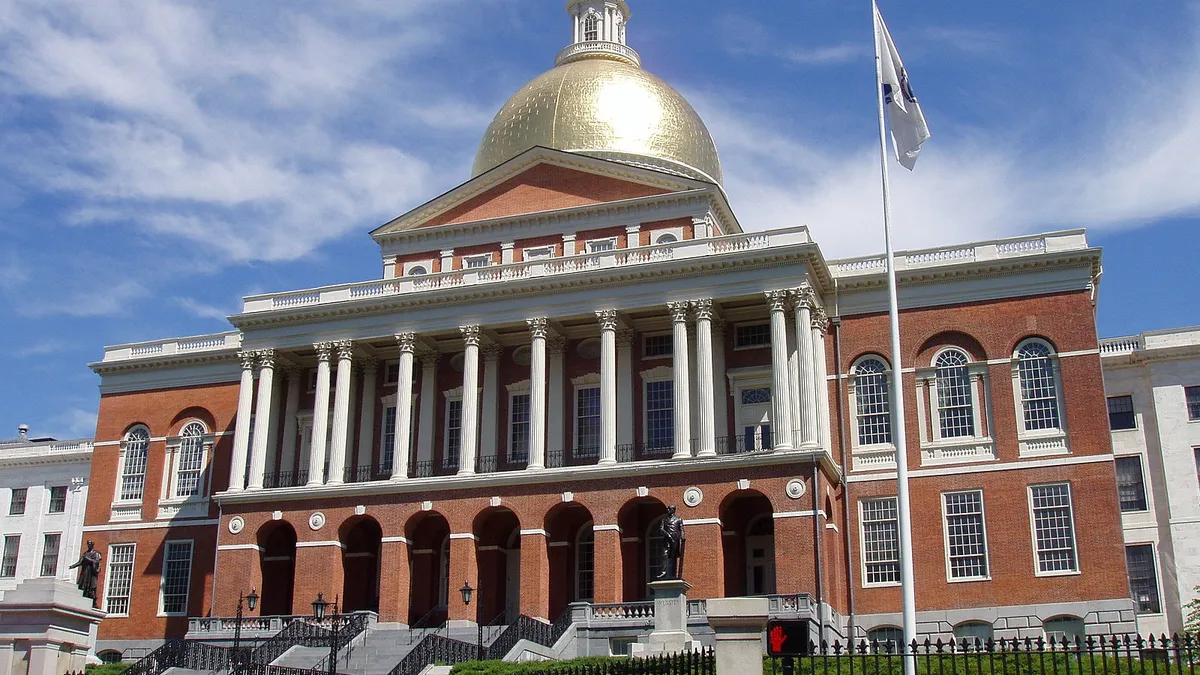As the end of the official two-year legislative session approaches, the two chambers of the Massachusetts legislature are in conference over a package of energy bills that include a 100% clean energy target and a 10 GW offshore wind goal by 2035.
On Monday, a petition led by retail electricity suppliers in the state was circulated to attack one clause within the overall package, a section that was crafted with the support of the state Attorney General Maura Healey.
The provision, which was included in S. 2842 without amendments from a 2021 Senate bill submitted by Sen. Brendan Chrighton, D, would prevent retail suppliers from creating new residential contracts in the state or renewing those contracts after 2023.
The provision in question has yet to make it into the House version of S. 2842. The Office of the AG is in contact with the conference committee chairs regarding the provision, according to Chloe Gotsis, spokesperson for Healey. The legislators currently in conference over the bill were not available for comment.
“Each year, Massachusetts residents are losing millions of dollars to competitive electric supply companies, and we have the data to prove it. Our office has taken action against these predatory practices, and we are working with our legislative partners to push for changes in the law to better protect our communities from these scams,” Gotsis said in an e-mail.
Retail power suppliers dispute the reports and analysis from the AG’s office, and have been sending lawmakers testimonies in support of residential retail choice.
Monday’s petition is sponsored by the Retail Energy Advancement League, which includes Vistra, NRG Energy, Shell Energy and other retail energy suppliers, and presents support for maintaining residential retail choice from more than 1,000 residents. Comments range from favoring an open market to wanting access to affordable clean energy options from retailers.
“We are hopeful the legislature will choose to improve the function of the market, rather than ban competition and impose a monopoly on almost half a million customers that have chosen a different supplier,” Chris Ercoli, president and CEO of the Retail Energy Advancement League, said in an e-mail.
However, the AG’s office has also received over 1,000 complaints from residents about their experiences with retail electricity suppliers, detailing false promises of savings, having their electric service switched off, and various practices to get contracts signed. The AG’s office has recovered more than $15 million for customers in the state from settlements with retail suppliers, according to staff.
In the years that the AG has focused on consumer protections for this sector, it has not received resistance of note from Massachusetts residents, according to staff.
The state legislature has until the end of the month to pass the package during its official session.
Movement on residential retail choice beyond Massachusetts
The Massachusetts AG first called for residential market reform in 2018, and other states have made similar efforts to protect consumers. New York and Connecticut have both scaled back the residential retail energy market in recent years, and more states have proposed rules and laws that could restrict it.
AG Healey’s office has put out analysis showing residential retail suppliers target residents in low-income and historically marginalized areas, charging them higher rates, and other consumer protection groups have made similar efforts.
“Reams of pricing data” have established that “this retail industry sends sales guys into the lowest income ZIP codes, communities of color and [to] seniors, and charges obscene rates,” Laurel Peltier, chair of the Maryland Energy Advocates Coalition, said in an e-mail. Peltier co-authored a 2018 report from the Abell Foundation criticizing Maryland’s residential retail supply market.
“And the only arrearage data — how far a family is behind on their utility bill — is from MA,” Peltier said.
Over five years, competitive electric suppliers in Massachusetts charged individual residents more than $426 million on their bills compared to what they would have paid to their default utility company, according to the April 2021 report from the Office of the AG.
The Retail Energy Advancement League and other retail electricity supplier coalitions have disputed the figures in the report, which included confidential data based on the insistence of participating suppliers for non-disclosure agreements.






















